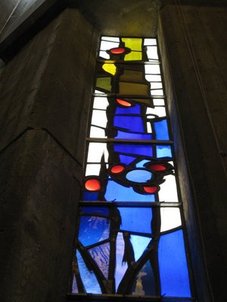
I am not one to conceal the ear buds of my smart phone. I won’t listen to podcasts of dharma talks in service because I don’t want to miss Reiko at the organ, the choir, the bell chorus chiming out its melodies or the musicians we sometimes hire to play interesting or unfamiliar instruments.
Because I am about to complain, you have every right to wonder why I don’t just stay home that one hour on Sunday. I’m there many other days of the week with commitments and committees.
Of course, like others, I go to service with my own needs, preferences and mindsets. Right now my mind is set on compassion, with seeing through duality to the interconnection between all beings, which I believe is not only possible, but already actual. Do I hope for too much if I wish to be challenged to try to be kinder, to try to see someone else’s point of view, in short, to move beyond us and them to “the interdependent web of all existence of which we are a part?” For the rest of the week, I will be awash in rhetoric from the left and from the right, some subtle, some stupid, but always polarizing, always “us against them.”
I am not keen to hear my ministers congratulate me for being on the right side of some social issue. If there is a right side, there is a wrong side. And because every issue has to be espoused or defended by someone, we now have those who hold wrong beliefs as opposed to right beliefs, and if we congratulate ourselves for being right, where does that leave those others?
In a polarized society, those others will not be understood, at least not by us. We will be congratulating ourselves for being pro-choice or pro-recycling and composting. And while we call ourselves an embracing community, our arms are mostly open to those who think like us, vote like us, march where we march, occupy when we do, and support our values. Of course, we love strangers, at least in the abstract.
And we love each other, though sometimes just as abstractly. Often we bring that “us vs. them” mentality, which is human nature, into our congregation. And this is where my dissatisfaction feels strongest with sermons that seem to reinforce the spirit of contentiousness rather than create wholeness or holiness. We do not need to agree but we do need to learn to respect and respond to each other with kindness. Then this response-ability can lead us into action.
Most of us don’t need to have righteous indignation reinforced. We don’t need to be encouraged to ride our “hobby horses,” those favored social positions we believe in fervently, those truths we hold self-evident.
In truth I often arrive at Sunday service feeling constricted, in pain, sorrow and fear, self-righteous and judgmental. What I want from the pulpit is not reassurance that my way is the right way but a reminder of my larger, kinder self.
The late Forrest Church said: “Universalism is an exacting gospel. Taken seriously, no theology is more challenging-morally, spiritually, or intellectually: to love your enemy as yourself; to see your tears in another's eyes; to respect and even embrace otherness, rather than merely to tolerate or, even worse, dismiss it. None of this comes naturally to us. We are weaned on the rational presumption that if two people disagree, only one can be right.”*
My idea of what I should do or be isn’t complicated. I think I should be open minded, open hearted and open to growing my capacity to love. And I do realize the ministers in my church are among those I need to “attend and befriend,” as Tara Brach puts it in a Buddhist teaching talk.
As I struggle to see beyond duality, I remember the Buddhist monk, Thich Nhat Hanh’s poem, “Please Call Me by My True Names.” He challenges me to experience the allness of each as he writes: “I am the child in Uganda, all skin and bones, my legs as thin as bamboo sticks; and I am the arms merchant, selling deadly weapons to Uganda.
“I am the twelve-year-old girl, refugee on a small boat, who throws herself into the ocean after being raped by a sea pirate; and I am the pirate, my heart not yet capable of seeing and loving.”
He ends by imploring: “Please call me by my true names, so I can wake up and so the door of my heart can be left open, the door of compassion.”
Only one of my true names is Unitarian Universalist. Will I wake up somewhere else? Church could be one place the door of my heart opens to all beings.
*From “Universalism: A Theology for the 21st Century,” UU World. Nov./Dec. 2001 (http://www.uuworld.org/2001/05/feature1.html)
 RSS Feed
RSS Feed